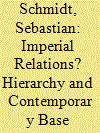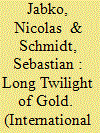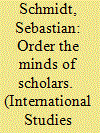|
|
|
Sort Order |
|
|
|
Items / Page
|
|
|
|
|
|
|
| Srl | Item |
| 1 |
ID:
135959


|
|
|
|
|
| Summary/Abstract |
Recent years have seen an increasing interest among international relations scholars in applications of pragmatist thought. Few works, however, have gone beyond discussing the epistemological and methodological implications of pragmatism. This article draws on a pragmatist understanding of human action to develop a novel explanation of norm change in contexts not amenable to more common analytical approaches. Specifically, concepts derived from pragmatism help explain how the creative recombination of practices by actors in response to changes in the material and social context of action can transform largely tacit notions of appropriate behavior. The article demonstrates the value of the approach by explaining the origin of a common contemporary security practice unknown prior to the Second World War and incompatible with the then-prevailing norms of sovereignty: the long-term, peacetime presence of one state's military on the territory of another equally sovereign state.
|
|
|
|
|
|
|
|
|
|
|
|
|
|
|
|
| 2 |
ID:
188896


|
|
|
|
|
| Summary/Abstract |
The prevailing assumption in discussions of foreign military basing is that such presences are hierarchical in nature. Though this was unavoidably the case prior to the Second World War, changes in the normative framework of international politics mean that such presences’ relationship to hierarchy has become an empirical question. Specifically, changes in sovereignty norms and the emergence of territorial and jurisdictional integrity render the linkage between foreign military basing and hierarchy contingent. As a result, some basing arrangements’ dynamics now closely resemble those of other interstate agreements. This analysis regrounds hierarchy in the specific normative context of action and in doing so highlights the implicit reification of the state in contemporary security studies. In practical terms, it shows how assuming hierarchy both overestimates the fragility of the US basing network and, by exaggerating authority relations, obscures the potential for greater fluidity in the basing space.
|
|
|
|
|
|
|
|
|
|
|
|
|
|
|
|
| 3 |
ID:
186594


|
|
|
|
|
| Summary/Abstract |
Why has gold persisted as a significant reserve asset despite momentous changes in international monetary relations since the collapse of the classical gold standard? IPE theories have little to say about this question. Conventional accounts of international monetary relations depict a succession of discrete monetary regimes characterized by specific power structures or dominant ideas. To explain the continuous importance of gold, we draw on insights from social psychology and new materialist theories. We argue that international monetary relations should be understood as a complex assemblage of material artifacts, institutions, ideas, and practices. For much of its history, this assemblage revolved around the pivotal practice of referencing money to gold. The centrality of gold as experienced by policymakers had important effects. Using archival and other evidence, we document these effects from the 1944 Bretton Woods conference through the transition to floating exchange rates in the mid-1970s; most IPE scholars underestimate the role of gold during this period. Power relations and economic ideas were obviously important, but they contributed little to a fundamental development: the long process of reluctantly coming to terms with the limitations of specie-backed currency, and the progressive and still ongoing decentering of gold in international monetary relations.
|
|
|
|
|
|
|
|
|
|
|
|
|
|
|
|
| 4 |
ID:
106924


|
|
|
|
|
| Publication |
2011.
|
| Summary/Abstract |
References to the Peace of Westphalia have played an important role in the discourse of international relations. Originally referred to as a concrete historical event and associated with a variety of meanings, such as the triumph of state sovereignty, the establishment of a community of states, and even the beginnings of collective security, the Peace was later transformed into a conceptualization of the international system. Beginning in the late 1960s, phrases like "Westphalian system" came to convey a package of ideas about international politics limited to the supremacy of state sovereignty, territoriality, and nonintervention, to the exclusion of other meanings. This conceptualization serves as a popular and convenient contrast to a more globalized order, but there are problems with its use: first, because the Westphalian system is an ideal-type that might never have actually existed, the impact of globalization may be exaggerated by scholars who employ it. Second, its use implies a linear progression from some Westphalian configuration toward some "post-Westphalian" state of affairs, whereas actual system change is likely to be more complex.
|
|
|
|
|
|
|
|
|
|
|
|
|
|
|
|
|
|
|
|
|